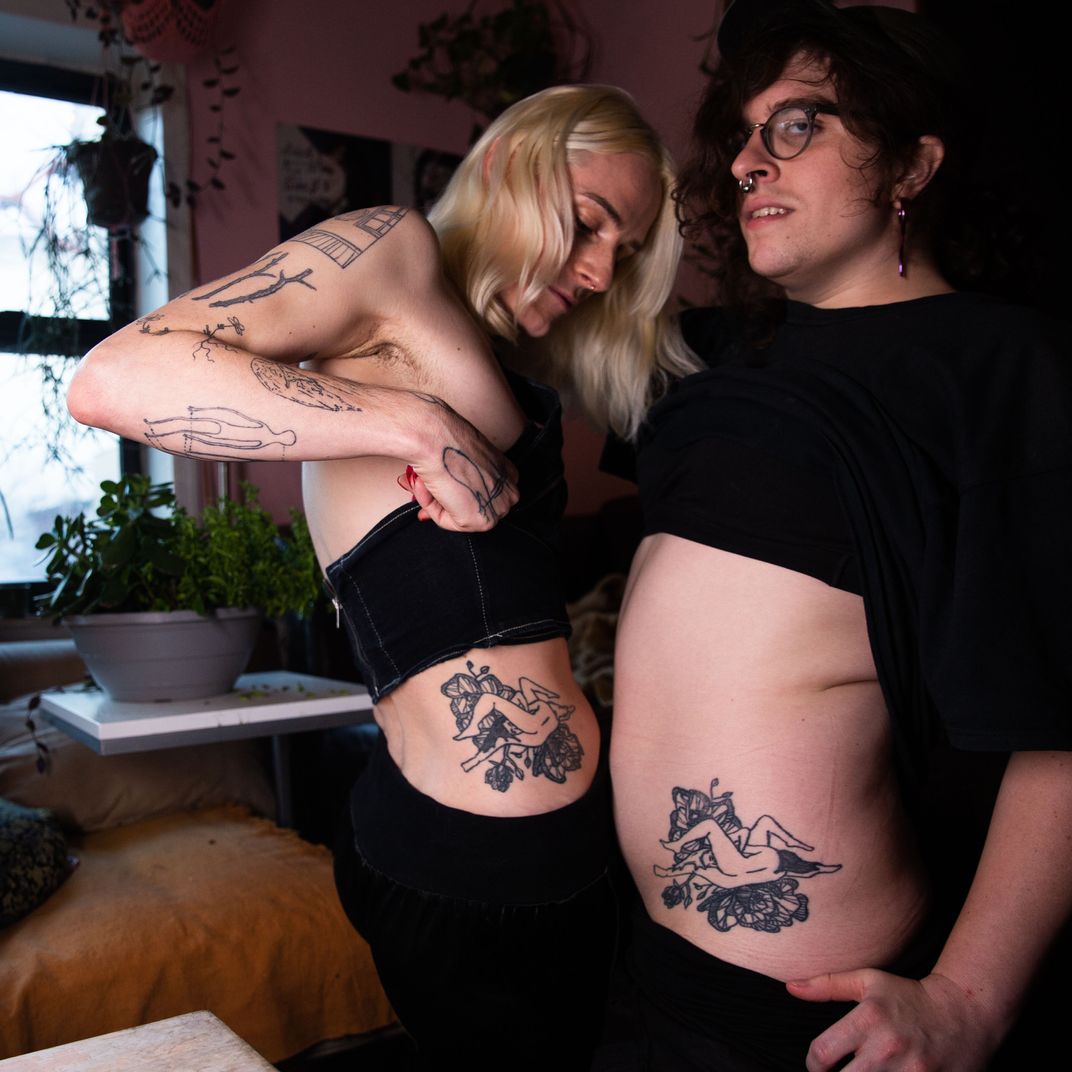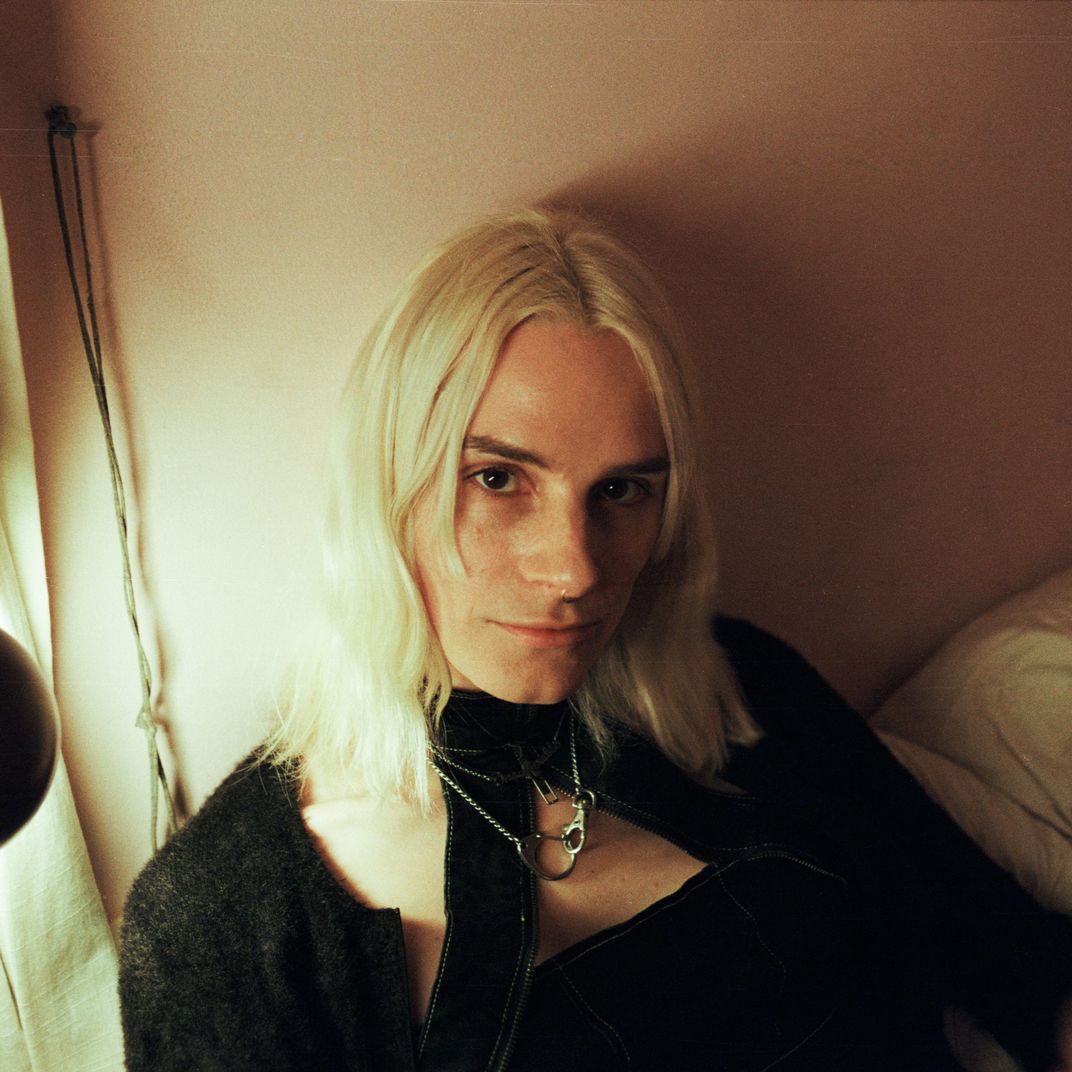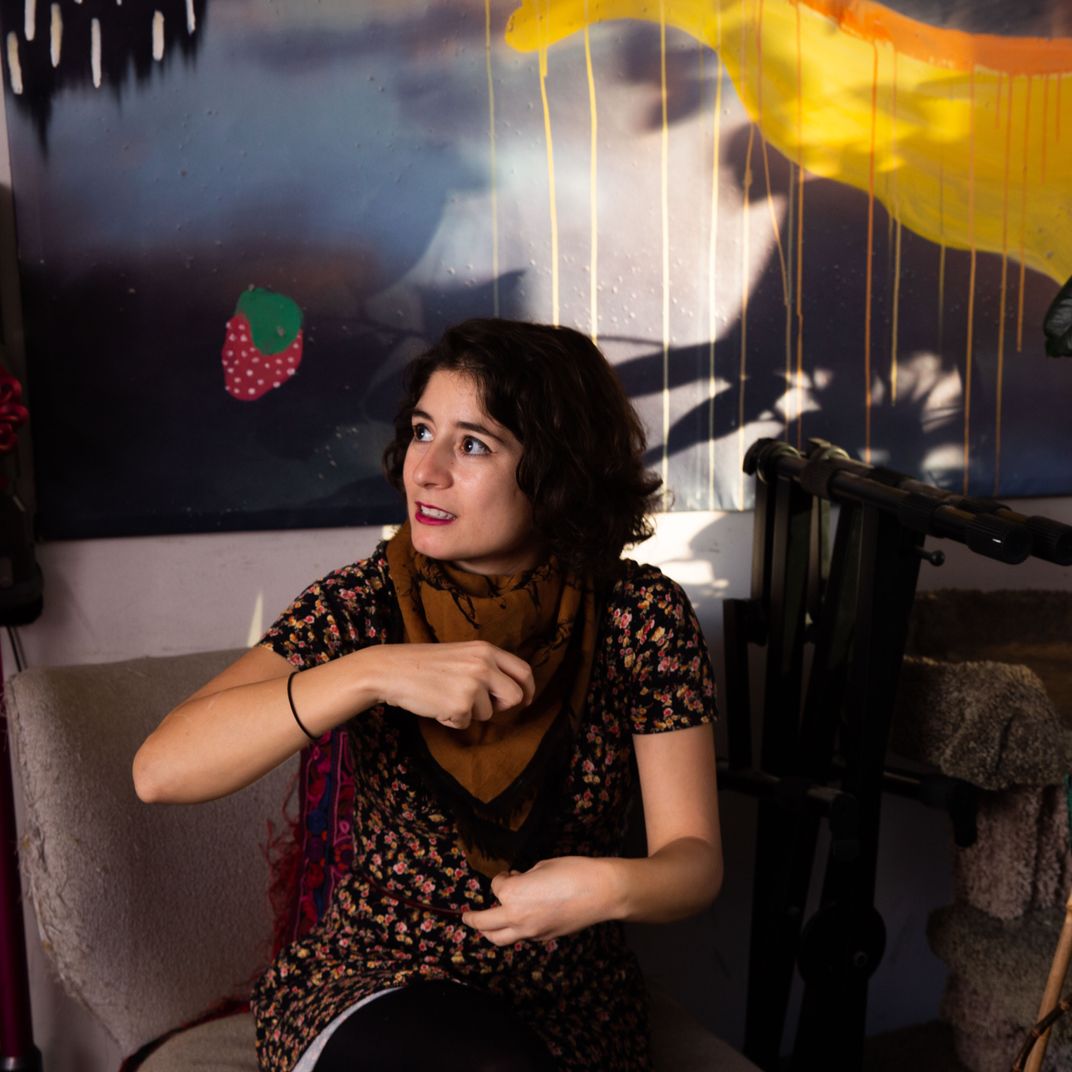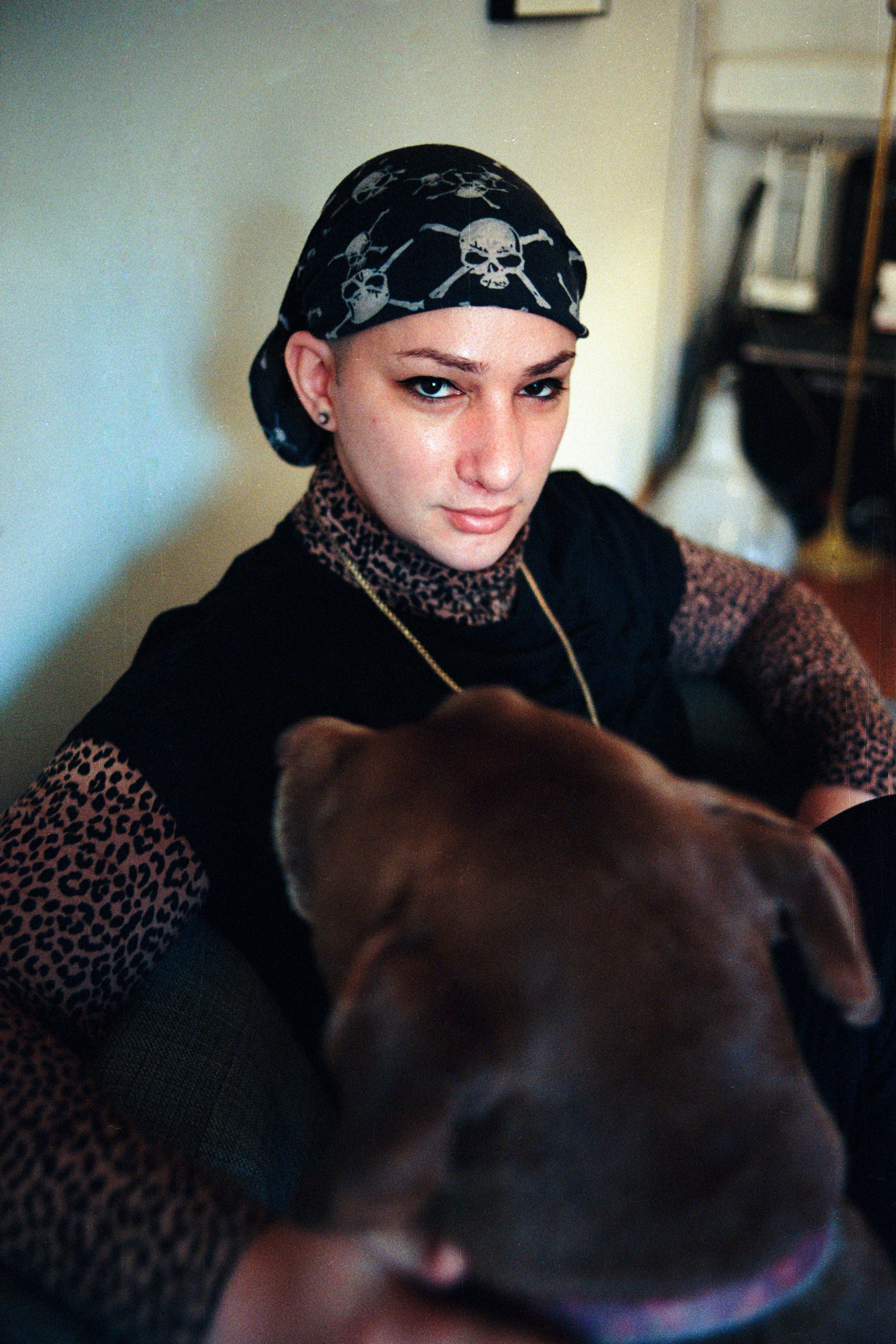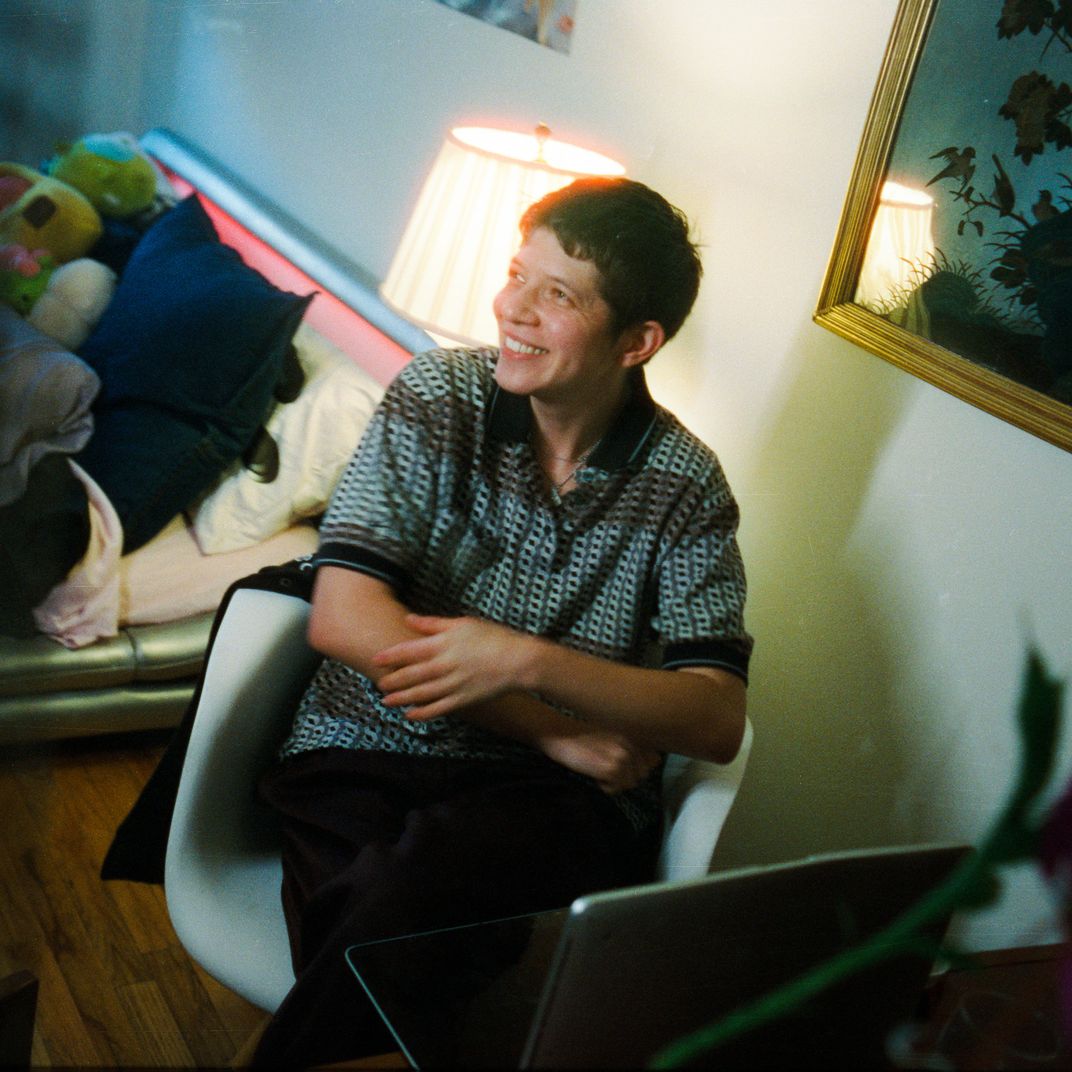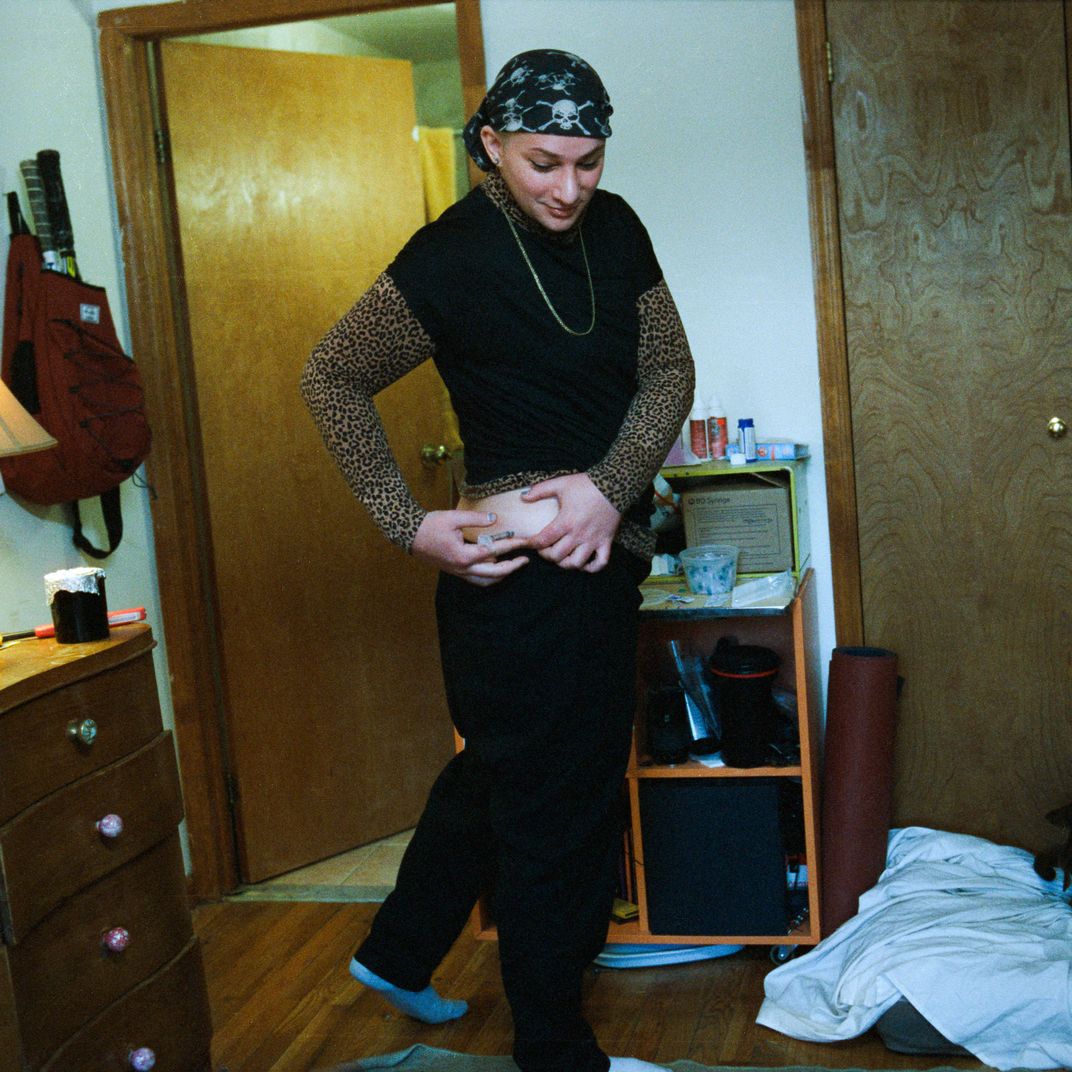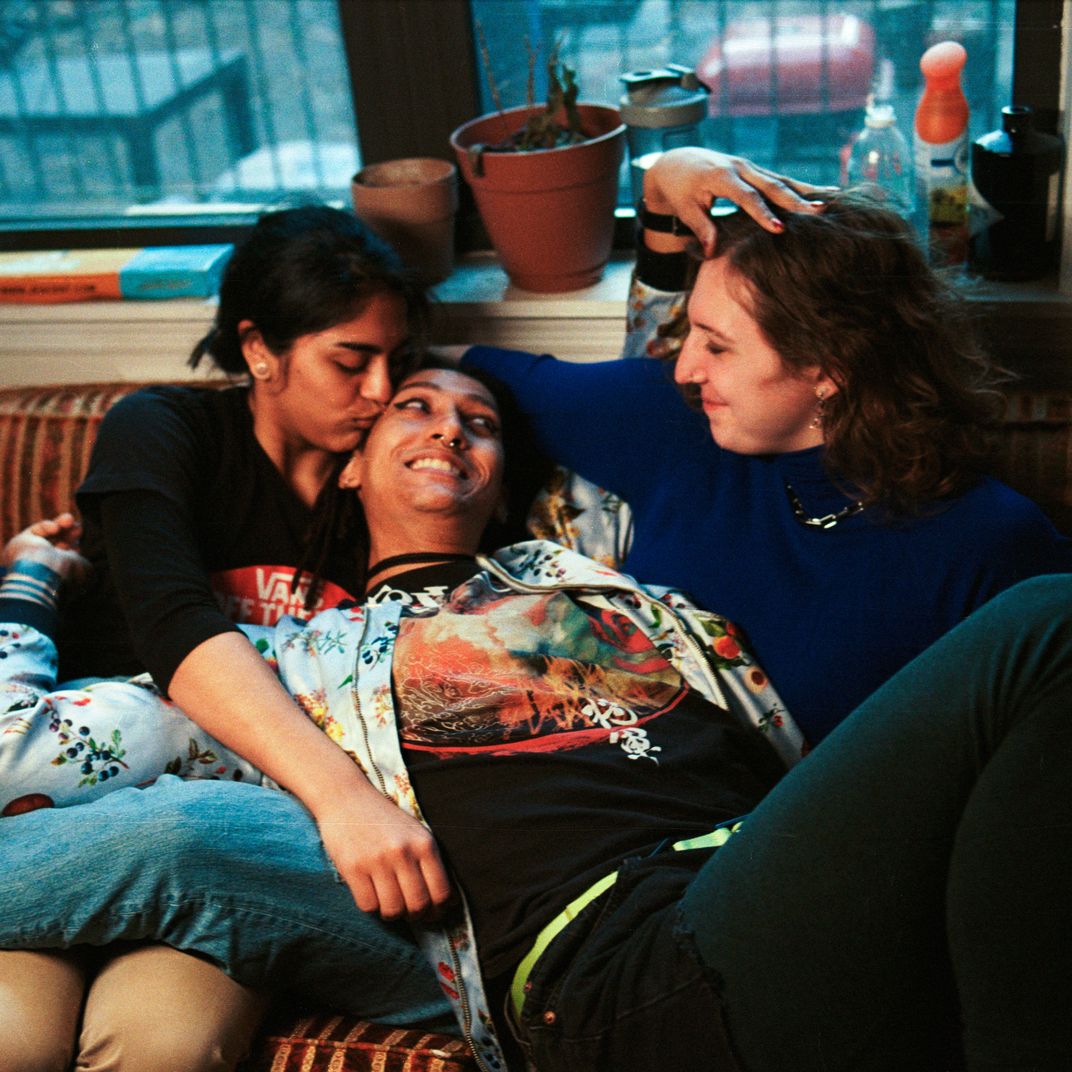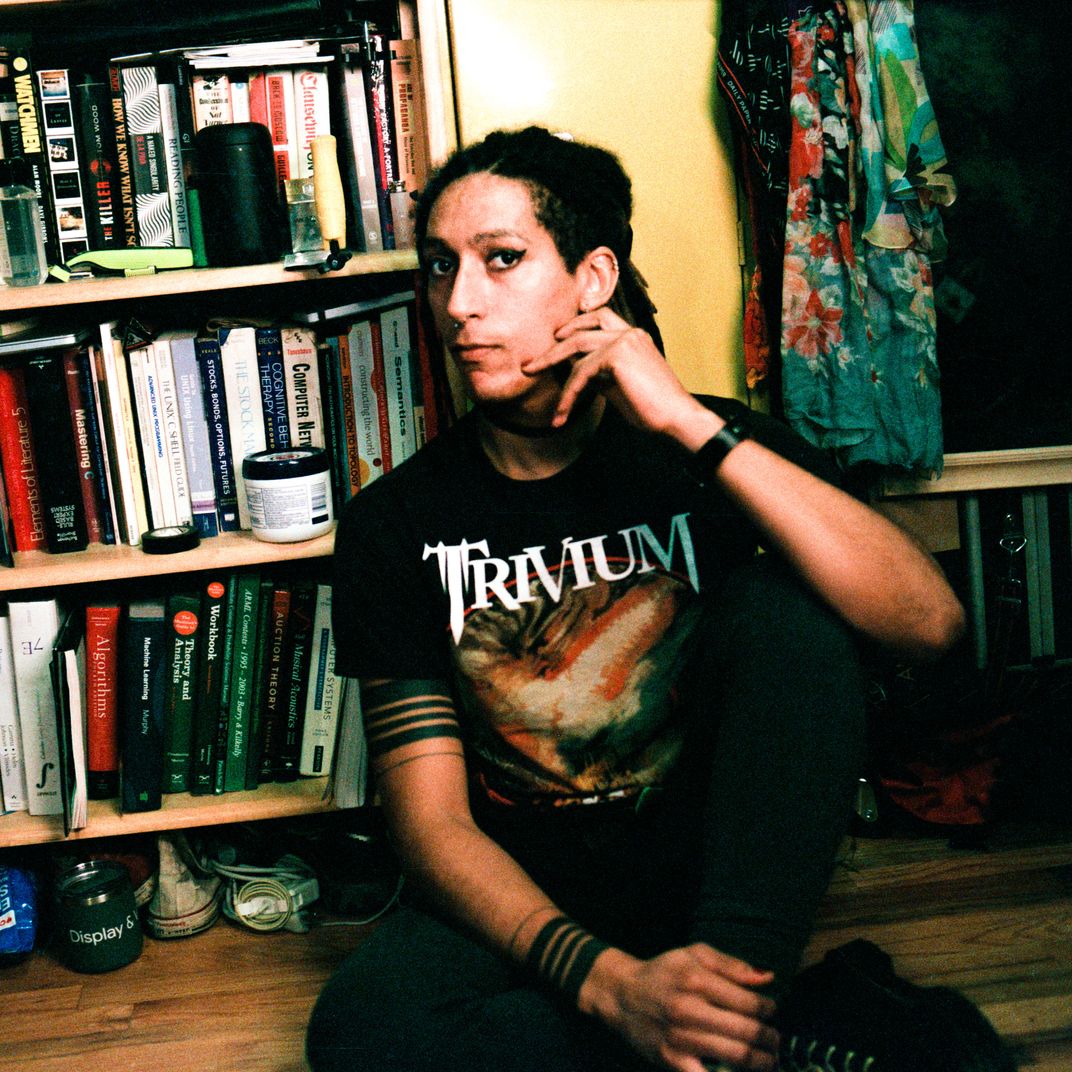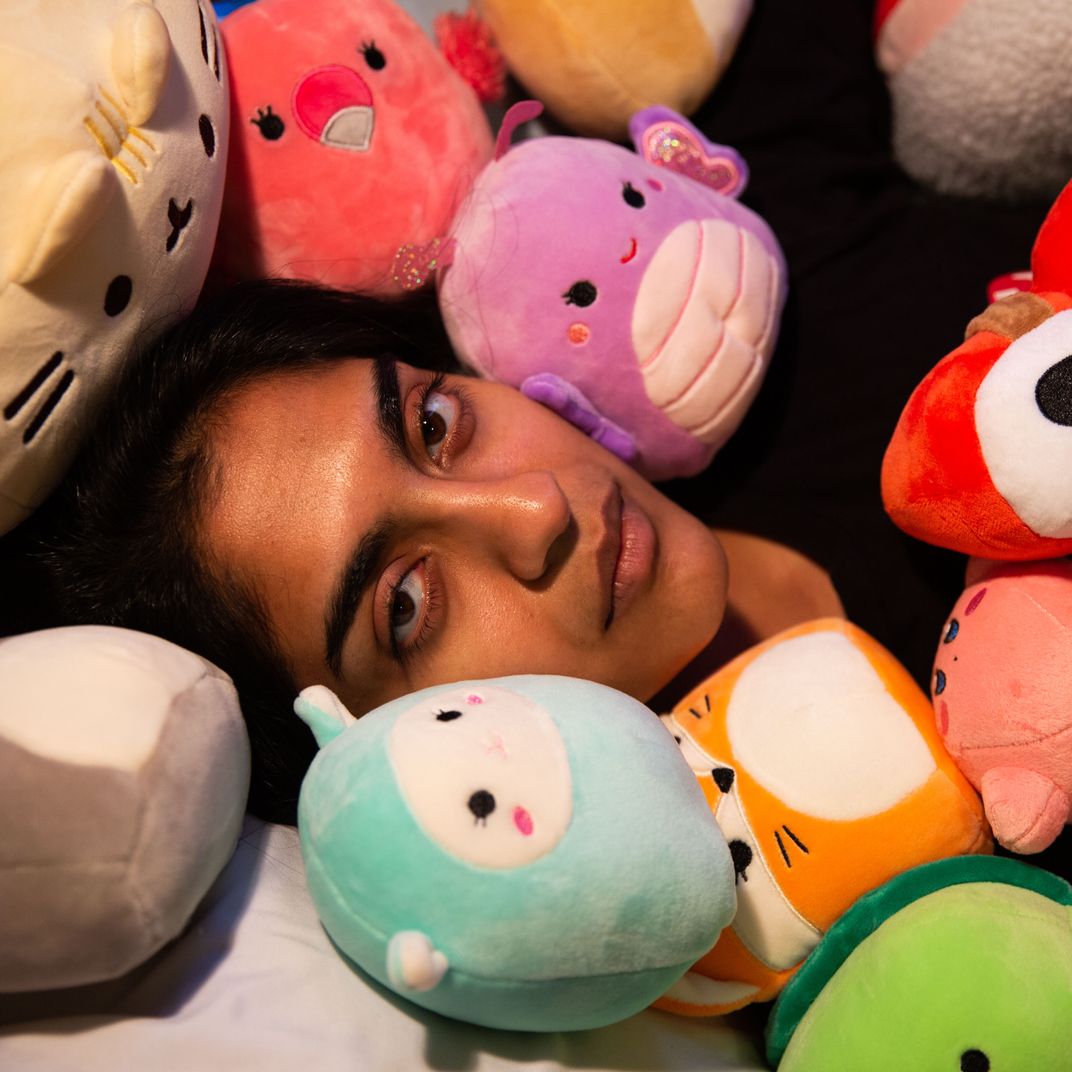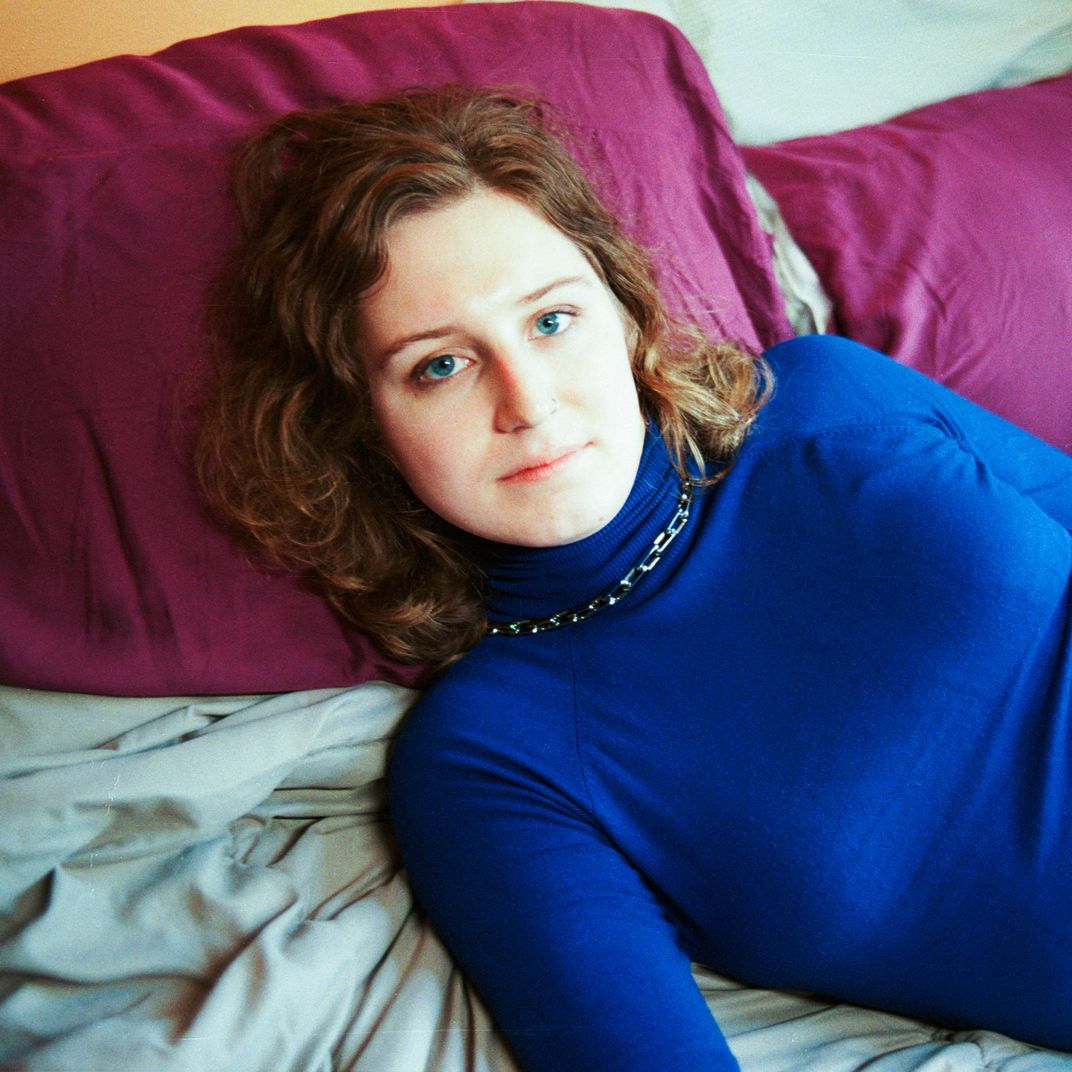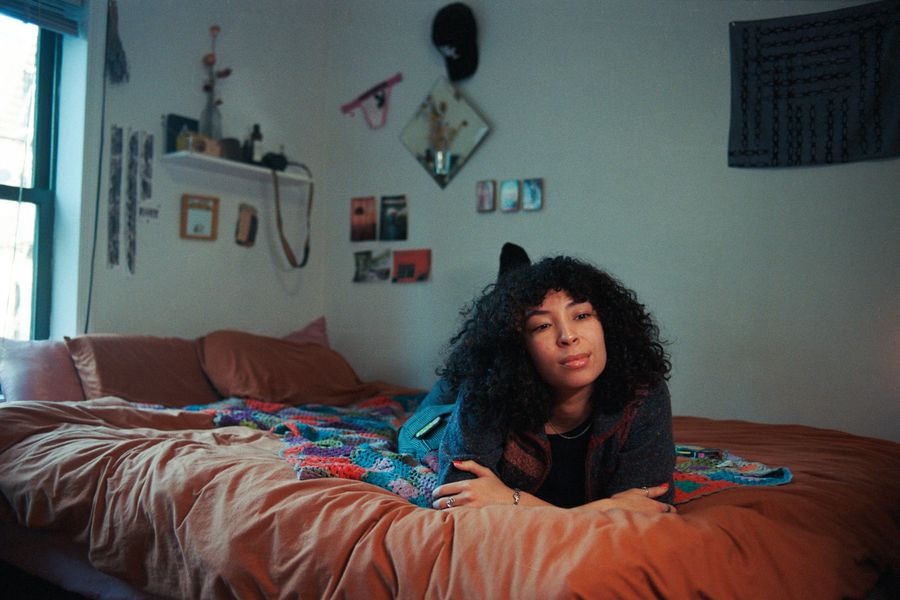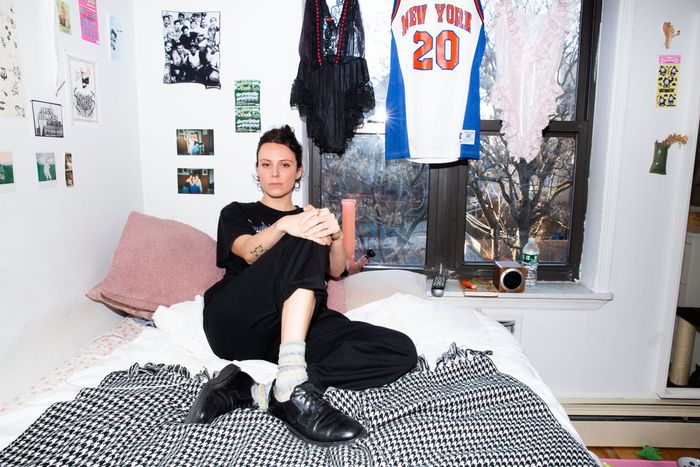
This article was featured in One Great Story, New York’s reading recommendation newsletter. Sign up here to get it nightly.
Last January, I was on the streets of East Williamsburg unloading a U-Haul with Charlie Markbreiter — a trans guy, a baggy-pants aficionado, a scholar of pop culture, a professor and Ph.D. student, and someone I’d met only once before. I had driven up from New Orleans after four years of being away from the city and was moving into an apartment I’d never seen in person. A beige brick building with those ugly Fedders air-conditioning boxes jutting out, four floors, four units of three bedrooms each. A front door that is perennially broken; nothing in the way of “amenities.” But it was cheap by New York standards (which means it’s still too expensive) because the pandemic scared away so many from New York. I didn’t feel hesitant — the vibes felt right. I mean, someone I barely knew was even helping me move in all my shit.
Jessica Dunn Rovinelli — filmmaker, blonde raver girl with many black, revealing getups, techno-record connoisseur, DJ, lesbian of renown — was the lone tenant in the building during the heights of the pandemic. We knew each other online, and after hearing that I was thinking about moving back to the city, where I lived all of my life up until 2016, she told me about the three-bedroom for rent on the second floor. A few months after I arrived, three more trans people — Sibyl Self, Natalie Hiehle, and Nana Singh — moved into the first-floor apartment. And three cis people moved into the fourth floor.
It took me all of two weeks to realize I’d found something I hadn’t even known I’d been missing. I can pinpoint the moment: I was sitting in the apartment upstairs from mine, chilling with a few of my new building mates, listening to some record that was probably flown in from Berlin or Oslo. Here was a chaotic set of trans people that could support me, who could each in their own way model for me how to live a happy life in a terrible world. Jessie did not intend to create a trans haven. She simply found this place on Craigslist after moving to New York, liked living here, and so never left. The rest of us followed, and not because we wanted to form something unique, not because we were friends (we didn’t even know each other!), but because the opportunity presented itself. But nonetheless, that is what the building has become — a refuge for eight trans people, plus a constant rotation of trans friends who use our building as a hub to party, to work, to simply chill.
But still, the remarkable thing about our shitty little building is not that we made a new, rad, trans collective in the middle of the pandemic (Inspiring! Trans People Form Radical Community to Weather Out the Pandemic and Prove That Sticking Together As Queer People Can Heal the World, read all about it). The remarkable thing, the really almost unheard-of thing, is that we found 12 people who like each other enough to live together.
Victoria Negri, Jessie Dunn Rovinelli, and Phoebe Jenkins.
“It’s nice that there are some kids who are much younger downstairs. They came out a lot younger, they came up with these shifts in New York in what it’s like to live as a trans person. Transness is much more a part of their world and it was not a part of my world at all. They still are looking to me for experience sometimes, I think. They don’t ask for help, and I don’t ask for info, but I watch us put out little feelers like we’re all asking each other for something. I find that quite moving.” —Jessie
“Jessie did an estrogen injection in front of me while we were chatting in the living room. I wasn’t sure how to react, if I should give her privacy and politely busy myself while she did it, if I should ask about it. She started talking about it in the way she talks about things, very openly and proudly. And I remember being blown away. I wish I could own everything in my life like this, to sit in the living room and be like, Here I am, here’s what I do that is very much a part of my everyday life, and this is who I am.” —Vicky
Victoria Negri, Jessie Dunn Rovinelli, and Phoebe Jenkins.
“It’s nice that there are some kids who are much younger downstairs. They came out a lot younger, they came up with these shifts in New York in what it’s like to live as a trans person. Transness is much more a part of their world and it was not a part of my world at all. They still are looking to me for experience sometimes, I think. They don’t ask for help, and I don’t ask for info, but I watch us put out little feelers like we’re all asking each other for something. I find that quite moving.” —Jessie
“Jessie did an estrogen injection in front of me while we were chatting in the living room. I wasn’t sure how to react, if I should give her privacy and politely busy myself while she did it, if I should ask about it. She started talking about it in the way she talks about things, very openly and proudly. And I remember being blown away. I wish I could own everything in my life like this, to sit in the living room and be like, Here I am, here’s what I do that is very much a part of my everyday life, and this is who I am.” —Vicky
Jessie’s apartment reflects the decade of life she’s spent there: It feels worn, but in a good way, like a boyfriend’s oversize jacket. There are scuffed floors; plants on every available surface, making it feel like a jungle, or at least a very cozy plant shop; and a mean orange cat named Pudding, the tiger of the jungle. The kitchen shelves are overflowing with spices and beans and grains. As she’s aged (we’re both 33 now, the oldest people in the building), the apartment has matured with her — there’s less trash, less strip poker.
“Transitioning in one apartment, spending ten years of your life in one space, is at once weird and comforting,” she told me. “There’s a very intense continuity of self, which can be horrifying for trans people, and maybe for anybody … This house is the only thing that’s ever been consistent.”
At the beginning of the pandemic, Jessie had to figure out how to spend her time. She watched a 14-hour movie one day. She shot a short film. She went to the local greengrocer a lot — her only semblance of routine. Eventually, she began inviting people over for late-night parties, blasting techno and reveling in the brief moments of human contact. She’d always been a rave girl — that was her main scene — and she was trying during the worst of the pandemic to re-create it.
After living alone for a time after everyone fled, Jessie now shares the apartment with two other roommates. There’s Phoebe Jenkins, a trans computer wizard, usually quiet gamer, manga reader, video artist, and wearer of Korn T-shirts, who mostly keeps to herself but also lets loose at parties, standing close to the DJ booth and dancing her ass off; and Victoria Negri, another filmmaker, a marathon runner, and one of the friendliest people I’ve met. Vicky is cis, but she does not feel like an intruder in a trans space. That’s partially because she is so friendly, but also because she has changed through living here.
P.E. Moskowitz, Charlie Markbreiter, and April Clark.
“I started joking that this is Transgender College; Natalie joked about Bushwick University. So maybe this is the trans frat of Bushwick University. Of course I will never go back in time and be transgender in college, but I feel like in a funny way I’m getting the experience of not just what it would be like to be trans in college, but if I went to a college where everyone was transgender.” —Charlie
P.E. Moskowitz takes their weekly estrogen shot while their dog, Remi, hangs out.
P.E. Moskowitz, Charlie Markbreiter, and April Clark.
“I started joking that this is Transgender College; Natalie joked about Bushwick University. So maybe this is the trans frat of Bushwick University. Of course I will never go back in time and be transgender in college, but I feel like in a funny way I’m getting the experience of not just what it would be like to be trans in college, but if I went to a college where everyone was transgender.” —Charlie
P.E. Moskowitz takes their weekly estrogen shot while their dog, Remi, hangs out.
Charlie and I took the second-floor apartment in January, and a few months later, April Clark, a 20-year-old comedian, moved in. Our apartment looks newer than apartment 3, and perhaps more sterile. Charlie is very neat. I am a girlboss, always busy with work. April is usually away at school, or performing shows, or traveling to see her girlfriend. She adds levity to our household (“—Kill April,” she recently wrote on our chalkboard to-do list). April’s also a child prodigy: She’s only 20, but is already in grad school; she can beat all of us in chess; she can solve a Rubik’s Cube in like 20 seconds. We have stickers on our apartment door spelling out “HYP HOUS” (the E’s fell off) because we all create content of some kind (April comedy, Charlie insightful essays, me less insightful essays), and because we all knew each other from Twitter.
After pandemic-induced loneliness, living with two roommates and spending lots of time with apartment 3 felt insane. We would hang out in intense bursts, then all feel too overwhelmed and shut ourselves in our rooms. “I remember you, in the middle of hanging out, would sometimes just be like, ‘And that’s that for me!’” Jessie recalled, laughing.
Nana Singh, Sibyl Self, and Natalie Hiehle.
“Whenever I’m really depressed, that’s when I’m super-thankful for living here. There’s a lot of people I can at least run into, and exchange a couple of good words with … it’s really a marked change since I moved in, and it’s like, Oh, the organization of my life is different. I’m spending way less time alone in my room playing video games or reading.” —Sibyl
“My roommates told the only other boy in the building, Charlie, to help ‘force-masc’ me, and I was like, ‘This is actually the feeling I want.’ Charlie kind of took my hand and was like, ‘Hey, maybe if we start using male pronouns, or calling you king, or dude, that would help.’ And so me and Charlie became our own little boys’ club. And it helped me realize I was a boy. I’m in the right place.” —Nana
“To the extent that anyone thinks I’m some weirdo, they don’t just think I’m some weirdo, they know there’s a bunch of us.” —Natalie
Nana Singh, Sibyl Self, and Natalie Hiehle.
“Whenever I’m really depressed, that’s when I’m super-thankful for living here. There’s a lot of people I can at least run into, and exchange a couple of good words with … it’s really a marked change since I moved in, and it’s like, Oh, the organization of my life is different. I’m spending way less time alone in my room playing video games or reading.” —Sibyl
“My roommates told the only other boy in the building, Charlie, to help ‘force-masc’ me, and I was like, ‘This is actually the feeling I want.’ Charlie kind of took my hand and was like, ‘Hey, maybe if we start using male pronouns, or calling you king, or dude, that would help.’ And so me and Charlie became our own little boys’ club. And it helped me realize I was a boy. I’m in the right place.” —Nana
“To the extent that anyone thinks I’m some weirdo, they don’t just think I’m some weirdo, they know there’s a bunch of us.” —Natalie
The first floor is the young floor, both in average cumulative age and in gender years — Natalie and Sibyl both started transitioning during the pandemic, and Nana just started transitioning. Their apartment centers around computers — video-game consoles, big computer monitors, synths — because all three are techies. They’re all a blast to hang out with, and I’m slightly jealous that they started transitioning so young. They’re a different generation. The new guard. I pretend to have kind of Mom Vibes toward them, but really, they’re fine without me — they don’t need a mom, I’m just old. But the words “mom” and “dad” are nonetheless thrown around a lot in this building. We trade places: Anyone can be a parent or a child, depending on the circumstance, depending on who has more experience in any given situation. Natalie, for example, insists Charlie is both her dad and her son.
Before moving here, Natalie and Sibyl lived in a cramped apartment in the East Village, where they felt very isolated. They spent most of the time in their rooms, with breaks every few days to go to a bar and unload all their baggage, gender and otherwise, on each other.
This place just made the most sense for them — there were trans people here, and the apartment was nice-ish for the money. “Even if I, like, hated your guts, all the other places that I looked at would have been worse than this place,” Natalie told me (thanks, Natalie). Plus, it was obvious Jessie and I were well-connected in the New York trans community, and she wanted some of that connection. Natalie, Sibyl, and Nana went from having basically no trans community to having maybe too much of it — their apartment is constantly abuzz with young trans people coming in and out, drinking beers and cocktails, mucking up their floors with mud from the building’s tiny backyard. People as far away from Montana — people they’ve never met — comment on Twitter about the “trans hype house” in Brooklyn.
This house has provided the youngins, but also all of us, with a little bit of insulation from a transphobic world — being around other trans people, in this bubble where you’re rarely made to feel weird or different, helps when you’re out in the real world. The insulation, the bubble, moves with you, at least as far as the bodega on the corner.
Apartment 4: The Thankfully Cool Cis People
In March, packages began arriving in the hallway of our building addressed to three people we’d never heard of. The landlord had given the fourth-floor lease to randoms, ruining our plan to stack the building with more friends. We Googled the names on the packages. We tried to deduce what kind of people they were from the vibe of each name — Mel Araluce, Claire Caro, Jazmyn Queen — terrified they’d be transphobic, or, even worse, boring.
Our fears proved unfounded. Yes, they ended up being cis, but they also ended up being really cool. Chill girls who were ecstatic to not live with a bunch of boring straight people, girls who seem to have an endless stream of skater boys filing into and out of their apartment (jealous!), girls who like to party.
“We didn’t know anything about the tenants of the building, but the relief when we found out that this whole building is just a safe and inclusive space was just like the cherry on top. I can even go into a different apartment to use someone’s stamps. Those particular instances are always treats for me.” —Mel
Once everyone moved in, things settled a bit — we still see lots of each other, but part of the success of our building is that it’s not 12 people living together, but four sets of three people who live right on top of each other. We have space. We have individual lives. When we get sick of each other, we don’t have to hang.
We began a group chat with all four floors, sharing important information like our rents so that we could effectively bargain and the status of our COVID-19 tests, and also equally important information like whom we’ve seen at the coffee shop and how hot they are, and which of us we should murder to make this story get more clicks. Getting anything done takes eons because every request turns into fodder for jokes (“Can I borrow an envelope?” “I can envelope you in a hug,” “Are you going to kill someone with that envelope?” etc., etc.). We also use it to plan parties.
Not to brag (I’m bragging), but my birthday party in July was the biggest. Something like 200 people showed up. Our friends DJ’d all night. I wielded a huge sword one friend bought me and wore a plastic crown another friend bought me and traversed the building’s apartments and backyard, feeling like the queen of the universe. People began referring to the night as “OomfCon.” It was fun. It was also perhaps the first time in my life that I felt something resembling a cohesive community in this dumb city.
Ah, fuck. I’ve been in denial this whole time. All the queer stereotypes? We are them. Community. Chosen family. Curated space of radical possibility. Whatever the fuck you want to call it, and I insist you don’t call it those things, it’s true. Except somehow, we’ve done it in a way that doesn’t feel annoying; in a way, as Jessie put it, that doesn’t come with the connotations of a central morality, a determinism, a rule book for our group. We just vibe. Together. And separately. We’ve gotten away with the corny in a way that doesn’t feel corny. And if after reading this, you think it is, well, I’ve got news for you: You’re not invited to the next party.


